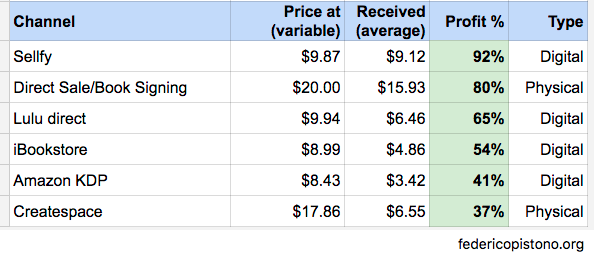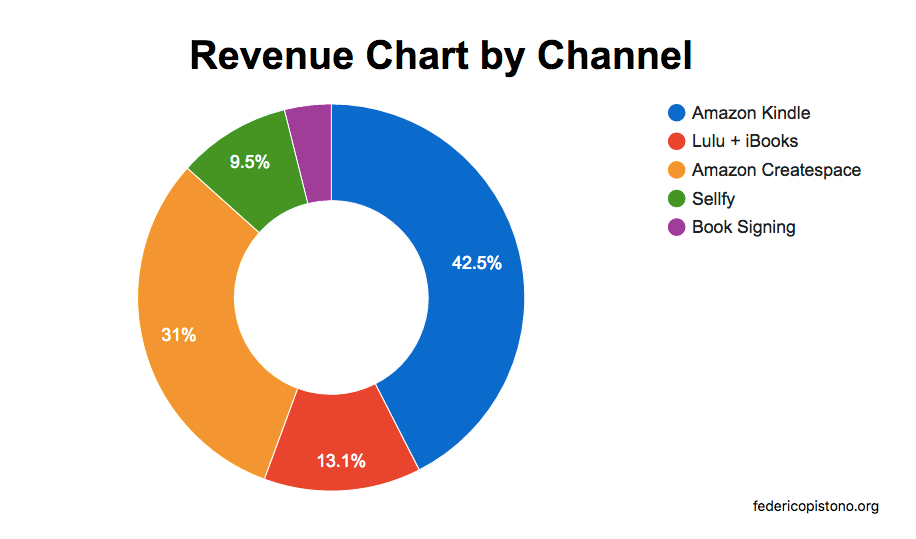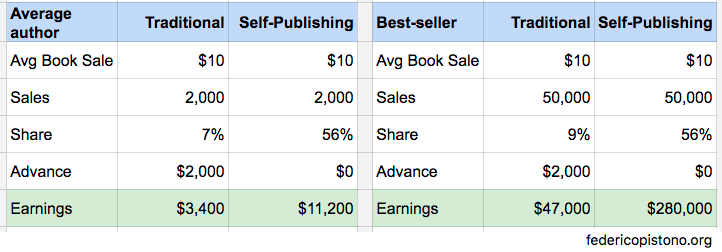how much can you make writing a book
Traditional vs Self-Publishing, How Much Money Can You Really Make?
Pros, Cons, and Lessons Learned by a Best-Selling Author
![]()

You have been thinking about it for a while. To put all those thoughts into words and start typing. To write a book, and become an author. Maybe you even dared to imagine what it would be like to quit your job and just focus on doing what you love.
To make your passion your job.
This is the dream I had back when I was still work i ng for a company, six years ago. At the time, I had no idea what I was getting myself into, and I didn't have any hopes for success. I was just a nerdy kid who wanted to tell a story.
My book went on to become a best-seller on Amazon, it was covered by the BBC, VICE, The Wall Street Journal, Wired, and it influenced policy at the European Commission and the Italian Parliament. It received enthusiastic praises by XPRIZE founder Peter Diamandis, the Financials Times described it as Johann Rupert's favorite book. It was then translated to Spanish, German, Italian, Portuguese, Complex and Simplified Chinese, and it's now coming out in Korean.
Since then, I have given advice to many dear friends who wanted to follow a similar path, find their own voice, and publish their first book.
"How do I start writing my book?"
"Should I find a publishing house, or should I self-publish?"
"How should I market it?"
"How long does it take?"
"How much money can I make?"
… and on, and on. These are just some of the numerous questions that keep popping up. Not long ago, the nth friend told me, once again, "Hey this was really useful, you should write a book about it!".
Alas, I'm not going to write a book on it (well, at least not for now), mainly for two reasons: (1) lack of time and (2) some did already, and it was pretty good.
Instead, I'll be writing an article—which might turn into a series—with the hope that:
- It can help you too, as it did my friends.
- It can scale and save me time. I enjoy one-on-one with friends, but I can't do it for all the random people who write me and ask me for advice.
I will not talk at length about all the steps to take. This is not intended to be a guide.
I'll be giving you the essential lessons that I've learned the hard way, and that I wish I had known when I started.
I self-published the book in English, Spanish, and Italian, while I decided to go with publishers for German, Complex and Simplified Chinese, Portuguese, and Korean. I know both worlds, and I suffered through the pains and tribulations of each.
I'll be taking a big risk by revealing some personal details and some of the industry's best-kept secrets and I'm sure this will anger someone. But hey, I'm a no-bullshit kind of guy.
Lesson 1: Do Not Write a Book to Make Money

If you're thinking of writing a book so you can make loads of money, retire and enjoy piña colada in some pacific island, think again.
I'll be very blunt:
It's almost impossible to make a living with book sales.
This is the hard truth, and soon it will become obvious why.
Yes, I'm sure you've read a story somewhere about a guy who sold gazillion copies by self-publishing on Amazon, or the wunderkind who got a million-dollar deal with her first book. And that's exactly why you read them, they're so astronomically unlikely that someone wrote an article about it.
Most people don't make any money writing books, and chances are you won't be part of the 0.01% that makes it.
This is a no-bullshit walkthrough of what you can realistically get.
How Much Money Can You Make With a Publishing House?
The math is simple. If you are a first-time author and you go with a publisher, you can expect the following deal:
- Advance: $2–4k
- 6–10% of the book sales—usually in two-tiers, a lower percentage up to 10k copies, 1–2% higher after that
- 20–30% of the ebook sales
This means that if the book sells for $10 and you manage to sell 50 thousand copies, you'll be making $50k.
If you're lucky.
In its entire lifetime.
The median household income in the US is $52k, and that's per year. So if your book sells well—and believe me, 50k is a fantastic result for a first-time author— you'll be making in 10 years what a normal person makes in just 1 year.
I hope you do, but chances are you won't sell well.
What's a realistic figure?
The average book sells 2,000 copies in its lifetime. So, with the advance, that's $4–5k for you. Just about enough for one/two months of living, but spread across 10 years.
It makes sense, though. 2,000 copies selling at $10 each would gross $20k. That is, not coincidentally, barely enough to cover taxes, your advance, the time of the editor, the graphic designer, and the (very) minimal marketing the publishing house put forth. It's simple math, really.
There are, of course, exceptions. Some first-time authors get six-figure deals, but unless you're a known fugitive wanted by the FBI and CIA, a media sensation, or a world-champion athlete, you're likely to get the deal I just described.
Pros of traditional publishing
- They take care of all the editing and proofreading, which is a huge deal for me since I'm terrible at it. The first revision of "Robots" was full of typos—even though I had a Ph.D. in English literature check it—so much so that I got some bad reviews just for that reason, which brought the average down substantially. I then fixed the issues and offered free updated digital copies to all those who bought it before, and almost all the reviews since then have been 4 or 5 stars ★★★★★, but the damage had already been done. I'm sure this very article will have tons of typos as well. If you find one please send me a message.
- They take care of formatting and exporting in all the formats. I'm pretty good with computers. I started messing with them 20 years ago, when I was 11, and I've been programming for 15 years. I write my books in LaTeX and export them to different formats. I know how to do this stuff. But hell, it takes so much time. For any editing of any of the languages I decided to self-publish, I had to make: 4 different PDFs sizes, ePub (2 versions), mobi, and check each one individually. For three languages, that's 21 exports and versions for each revision. It's an insane amount of time lost, while I could have been doing something more useful. Like… writing my next book?
- They save you time. It's a bit of a corollary of the first two, but that's pretty much it. If you value your time, and I do now much more than 7 years ago, a publisher will save you tons of it.
Cons of traditional publishing
- You will get a small advance and probably won't see any more money for another 7–13 months. Depending on your contract, they might decide to pay you every six months or yearly. Then it will take a month to process your payment, so there you have it. Be prepared to not see any cash for a long time.
- Once you sign a contract, they own pretty much everything and decide everything. This means they get to decide the book cover, what goes on the back cover, the endorsements, distributions rights, marketing tone and phrasing, copyright rules, everything. For example, you may not be allowed to post a picture of one of the pages of your own book on Facebook, because you would be violating the copyright. It sounds crazy, but that's what some deals would require. It's unlikely the publishing house would be so stupid as to do so, and usually will give you permission to post a certain percentage of the book or even a chapter for promotional purposes. But that would be agreed upon in advance with them. Once you sign, you relinquish the right to decide what you do with your book, because it's not your book anymore. It's theirs, for as long as they own the rights, which depends on your contract.
- They won't help you with marketing. That part is still up to you, unless you're Stephen King or J. K. Rowling. Authors are expected to do their own marketing, social media, and outreach. The reason, again, is simple math: publishing houses don't have a budget for you. Unless they think you can sell hundreds of thousands of copies, which is unlikely, they will expect you to sell about 2,000, which barely covers the essential expenses.
How Much Money Can You Make by Self-Publishing?
Let's take the same example as above, with the revised figures. Self-publishing allows you to keep the majority of the profits and gives you the highest flexibility with how you want to distribute your content.
Here the royalties are almost orthogonal to tradition publishing. If with a publisher you get 10% or less, with self-publishing you can get anything between 50–90%, depending on the distribution channel.
If you google "self-publishing royalties", you will see an endless list of pages citing various percentages, and I can tell you they're almost always wrong. This is because there are so many variables that you can't really know how much you're going to get until you actually receive your money.
For example, Amazon Kindle Direct Publishing (KDP) will claim to give 30% or 70% to the authors (depending on the deal), except it only applies to sales on specific territories, then there is VAT, taxes, wire transfers fees, fees for cashing checks and for converting currencies, and almost each country has its own variable pricing and offers.
In the end, it's not 30% or 70%, not even close. In my case, I got an average of 41%.
Don't believe blogs and articles from people who have not gone through that themselves. In real life, actual numbers are always different from the advertised.
I will now do what no author in their sane mind would ever do, and disclose exactly how much I made for each sale on the various channels I used.
Hurray for radical transparency!

Amazon KDP is such a bad deal (41%) that you're almost better off with a publishing house, which offers around 25% but does all the work of turning your word/latex file into a working ePub/mobi, taking away all the hassle of formatting it, revising it, and fixing the many, many compatibility issues which I can guarantee you will arise.
Amazon Createspace, the physical distribution of the behemoth created by Jeff Bezos, is the worst one of all, with a mere 37%. This is due to many reasons, not last because it detracts taxes before sending you the money (at least for me, a non-US citizen), as well as aggressive pricing stance due to its quasi-monopolistic position in the market.
Sellfy is a direct sale of a digital file, and it's by far the best way to maximize your earnings. It keeps around 8%, which includes the PayPal commission, and you can sell exactly the file that you want, as you want it. I chose to sell DRM-free PDFs and ePubs. It also pays right away instead of at the end of the month and takes care of all the hassle.
So, if you like an author and you are thinking to yourself "I love your stuff, how do I support your work the best?" you should get the direct download on Sellfy (or an equivalent service) whenever available, and avoid the big distribution. Chances are they're making little to nothing when you're buying it on Kindle or iBooks.
So, if Amazon is such a bad deal, why is everybody using it?
The answer, is, well, everybody's using it.
Here's the same chart as before, but with the relative size of the earnings.

The Amazon empire, even though it offers the lowest revenue share of all services, accounts for over 73% of all earning. And that's netto, after taxes! With most other distributions channels I receive the money brutto, and then I have to pay taxes (which depend on too many variables to list and estimate here).
Later on, I also published on Google Play, but I haven't run the numbers for it, since it was so late and so little I didn't even bother.
Let's run the simulation with an average price of $10 like we did before for traditional publishing.
It will very much depend on how strongly you push a particular channel. You could choose to only use direct sale/Sellfy, thus maximizing profits per unit, but you won't get any network effects or random purchases by people browsing, looking at charts, or following the "Customers Who Bought This Item Also Bought" suggestions on Amazon.
It's a gamble. I prefer to publish in all channels possible, for many reasons, but 2 in particular:
- I am not concerned with money. Since I'll be making so little of it from book sales anyway, it's best to just make it as easy as possible for people to buy it in the way they find most convenient. Whatever they're already using, whatever is one-click away.
- It's better to have 50% of a very large pizza than 90% of a small slice. I don't think I need to explain this.
So, taking our average lifetime book sales of 2,000, with a ~56% profit, we get $11,200.
This is a Fermi guesstimate I made, but it is not far-fetched. In fact, I was surprised by how accurate it was. I checked it against some hard data and found that in 2014 most professional authors made only $8,000, well below the poverty line.
Here's a summary of the full simulation.

In both cases, self-publishing gives you much more money, which grows more substantial as you sell more copies. However, that's not the whole story.
Say you spend 300 hours doing the book cover, formatting, exporting, distributions, etc., estimate at $40/hour, you just spent $12k worth of time doing something, which others could have done for you.
Ask yourself, how much is your time worth? A professional on UpWork can get the job done for $30–40 an hour, probably faster and better than you. Do you think your time worth $40 an hour? What unique thing could you be doing in that hour, that nobody else could? How much is that worth?
Also, if you go with a traditional publisher and sell 50k copies, your second book deal won't be a mere $2k. You'll be able to negotiate a much bigger advance, higher shares of the profits, and retain more creative control. They will also have a marketing budget, now that they know what you write can sell, they'll book you interviews with newspapers, TVs, radios, you'll be invited to conferences.
The same can happen also if you self-publish, but again you'll have to do it all yourself. Unless you hire a manager, which then will cost you (quite a bit) and your profits will go down.
It's a trade-off, and not an obvious one.
So which should you choose? Traditional or Self-Publishing?
I hope to have been successful in conveying how money isn't a relevant variable when choosing if you should write a book, and through which channel.
Other things are more important.
If this article gets enough attention, I will take it as a sign that some of you found it useful, and I will be continuing the series, exploring other secrets of publishing and what I've learned.
A small note on the term "best-seller". Here I am simply using it to mean a book that sold well (50k), but the real definition is not commonly agreed and defined in the industry. A few thousand copies sold in the first week can make you jump to the top of the Amazon global best-seller list, even if you sell zero copies after that. Of course, that's unlikely, but it can happen. Many authors play with that algorithm (or even game it), to boost interest and sales for the future. I might talk about that in a future article.
how much can you make writing a book
Source: https://medium.com/@FedericoPistono/traditional-vs-self-publishing-how-much-money-can-you-really-make-c5732afeabaf
Posted by: cappsandiflamboy.blogspot.com

0 Response to "how much can you make writing a book"
Post a Comment